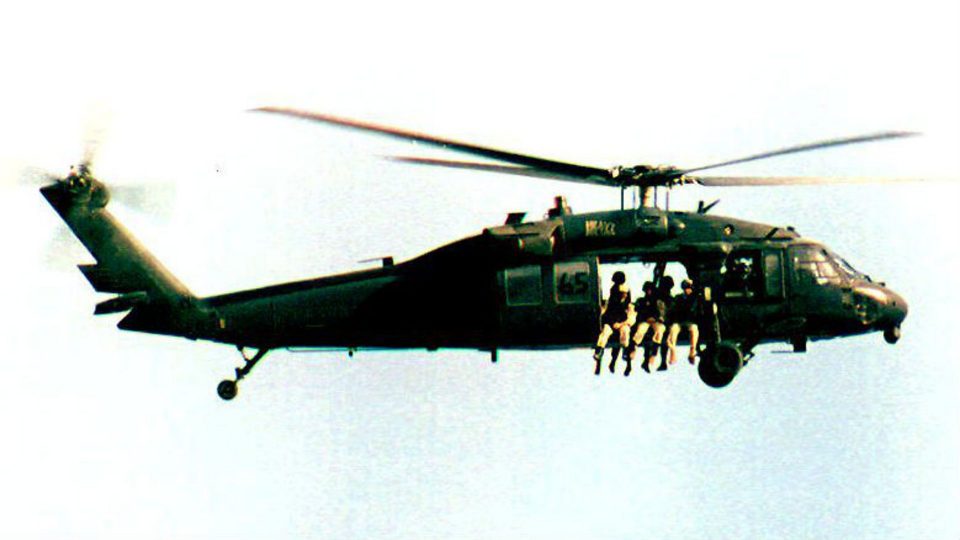Aug. 26, 2022 5:05 pm EDT
By Jeff Ames
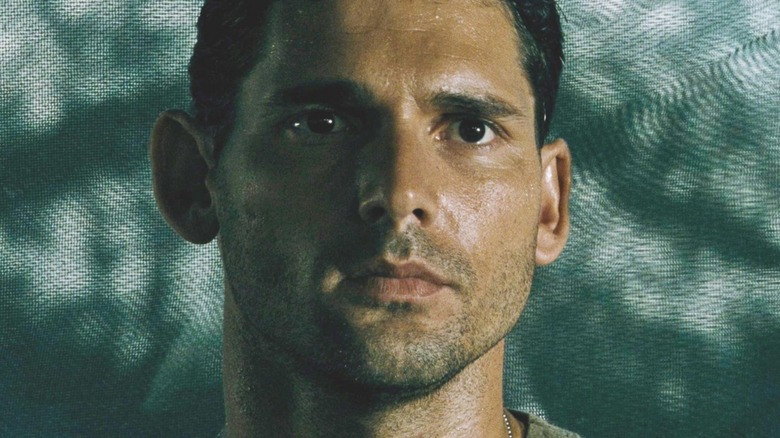
It’s hard to put together a list of the greatest war movies without including Ridley Scott’s “Black Hawk Down.” The 2002 drama, released just after the September 11, 2001 terrorist attacks, details the 1993 American military operation in Mogadishu, Somalia with stunning realism. Scott’s technical prowess is on full display and the iconic director of classics such as “Alien,” “Blade Runner,” and “Thelma and Louise” paints an honest depiction of combat that impacts the viewer on an emotional and visceral level.
Featuring a strong cast consisting of Josh Hartnett, Eric Bana, Ewan McGregor, Tom Sizemore, Sam Shepard, Orlando Bloom, and many others, the war drama grossed $172 million worldwide upon its release and scored positive scores from critics, including Roger Ebert, who praised the film for focusing on the actual experiences of combat troops and avoiding “speechmaking and sloganeering.”
Still, as with most Hollywood depictions of fact-based stories, while “Black Hawk Down” stays mostly true to the events that inspired it, a lot of important details were omitted from the film in favor of a more streamlined experience. Here’s a list of everything “Black Hawk Down” doesn’t tell you about the true story.
Grimes’ name changed to avoid controversy
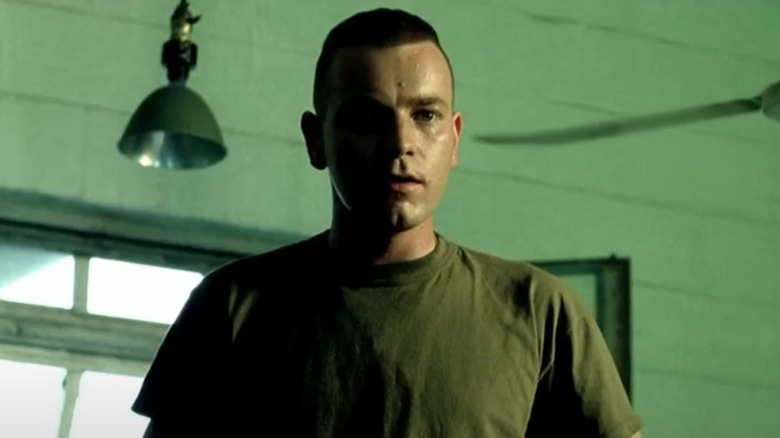
Grimes stands in a room- Sony Pictures
“Black Hawk Down” stars Ewan McGregor as Ranger John Grimes, a desk clerk who desires to see real combat and spends most of his days grumbling about his position as a coffee grinder. When the time comes to suit up, however, Grimes’ cavalier spirit is replaced by fear and uncertainty. Digging deep, Grimes discovers courage he never knew he possessed. This newfound power aids in his quest to do his duty and capably fight alongside his fellow serviceman during the arduous, relentlessly grisly battle.
The trouble is, Grimes is based on Ranger John “Stebby” Stebbins, a man who was court-martialed in 2000 and thrown in jail for 30 years after he was convicted of raping and sexually abusing his six-year-old daughter. “Black Hawk Down” author Mark Bowden kept Stebbs’ real name in his book, but gave the character a new identity in the film’s screenplay at the insistence of the Pentagon.
That drew outrage from the former Ranger’s ex-wife, Nora Stebbins, who penned a letter to the New York Post in which she said, “[Producers] are going to make millions off this film, in which my ex-husband is portrayed as an all-American hero, when the truth is he is not.”
If you or anyone you know has been a victim of sexual assault, help is available. Visit the Rape, Abuse & Incest National Network website or contact RAINN’s National Helpline at 1-800-656-HOPE (4673).
Atto abduction was more intense
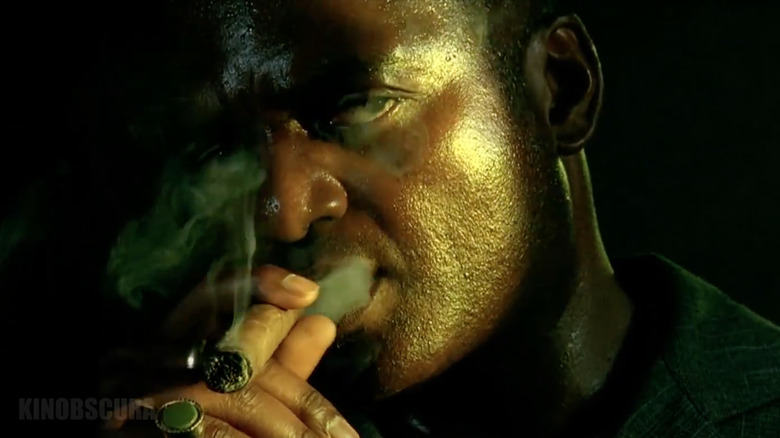
Atto smokes a cigar – Sony Pictures
Early in “Black Hawk Down,” the U.S. special operators forcefully stop a convoy and apprehend Osman Ali Atto (George Harris), the warlord Mohamed Farrah Aidid’s top lieutenant and financier. The sequence is brief. Sniper Gary Gordon (Nikolaj Coster-Waldau) shoots the hood of the vehicle transporting Atto, forcing the car to break down. A number of Delta Force soldiers acquire the target and haul him away on a helicopter back to base, where he is later interrogated by General William F. Garrison (Sam Shepard).
According to the real Atto, his abduction wasn’t as civil as depicted in the film. “First of all when I was caught on 21 September, I was only traveling with one Fiat 124, not three vehicles as it shows in the film,” Atto told the BBC’s Hassan Barise in 2002. “And when the helicopter attacked, people were hurt, people were killed.”
Atto alleged that his vehicle was hit at least 50 times and that his colleague Ahmed Ali was injured during the operation. Atto also didn’t approve of his depiction in “Black Hawk Down,” nor Somali society in general. “I am not smoking cigars, I have no earring on my ears,” he said in the same interview. Indeed, an image embedded in the article displays Atto as a clean cut, suit-wearing businessman — a far cry from his overtly theatrical appearance in Ridley Scott’s film.
Hoot became a doctor
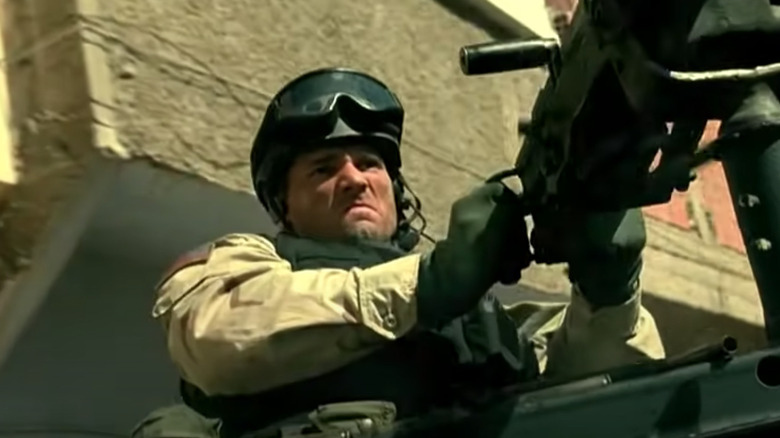
Hoot fires a weapon- Sony Pictures
The character of “Hoot” is one of the more memorable aspects of Ridley Scott’s war drama. As portrayed by Eric Bana, Delta Force operator Master Sergeant Norman Hooten is a battle-hardened soldier whose views on war come down to one simple statement: “It’s about the man next to you.” He says as much in the film’s closing moments, after participating in the Battle of Mogadishu from the air and, later, on foot. The character puts his life on the line to save his fellow comrades and even manages to break through enemy lines covertly to help Sergeant Eversmann’s crew escape during the intense closing hours of the conflict.
Offscreen, the real Norman Hooten traded his weapons for a stethoscope and eventually went to work at the Orlando VA Medical Center as a clinical pharmacist, according to VA News. His new mission has kept him off the front lines, but he still aids the military effort and spends much of his time assisting soldiers struggling with substance abuse.
“I’ve lost almost as many friends to substance abuse in the form of overdose deaths or death by suicide coupled with substance abuse disorders than those lost in war,” Hooten told the Army Times, noting that a number of veterans survive the horrors of war only to take their lives after returning home. As such, he started the Comprehensive Addiction and Recovery Act Clinic at the Orlando VA in 2017 and has been doing his part to help his brethren ever since.
If you or anyone you know is struggling with addiction issues, help is available. Visit the Substance Abuse and Mental Health Services Administration website or contact SAMHSA’s National Helpline at 1-800-662-HELP (4357).
Daniel Busch defended Super 61
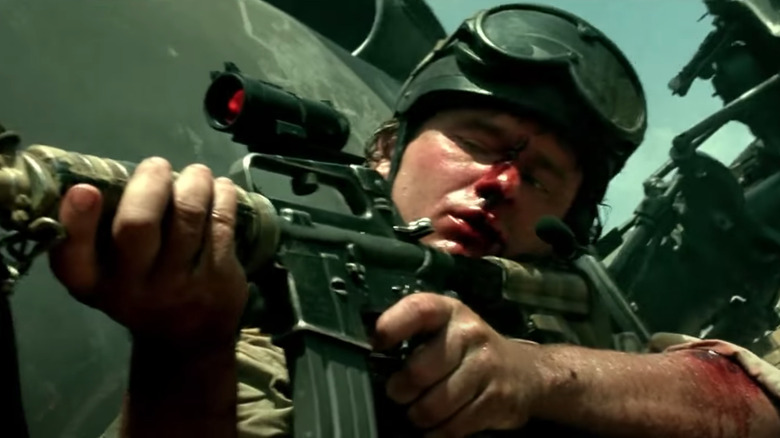
Daniel Busch with a gun- Sony Pictures
Staff Sergeant Daniel Busch was one of the soldiers who went down with Super 61 — i.e. the first Black Hawk helicopter shot down during the Battle of Mogadishu. The crash killed both pilots, Cliff “Elvis” Wolcott and Donovan “Bull” Briley, and left two of the crew chiefs severely wounded. In the film, Busch (played by Richard Tyson) stumbles out of the wrecked aircraft and holds off the advancing army alone for a time before an AH6 Little Bird arrives and carries him back to base. We don’t see the character again, though he is referenced among the fallen soldiers in the film’s closing credits.
Much of this is true. In fact, you can watch actual footage of Busch (on his feet) firing gunshots into the oncoming Somalia militiamen in a video aired by “60 Minutes.” However, he wasn’t alone at the time and was aided by fellow Delta Sniper and crash survivor Jim Smith, among others. Unfortunately, Busch died of wounds sustained that day, but did enough to help Smith and his crew come home alive.
“Without his fast actions we would have all been surely killed,” Smith told WKOW.com in 2019, noting that he was the one who carried Busch to the medical tent where he would spend his final moments. “I did all I could do to protect Dan and safeguard his life. A great man was lost that day.”
Aidid may have planned the whole thing
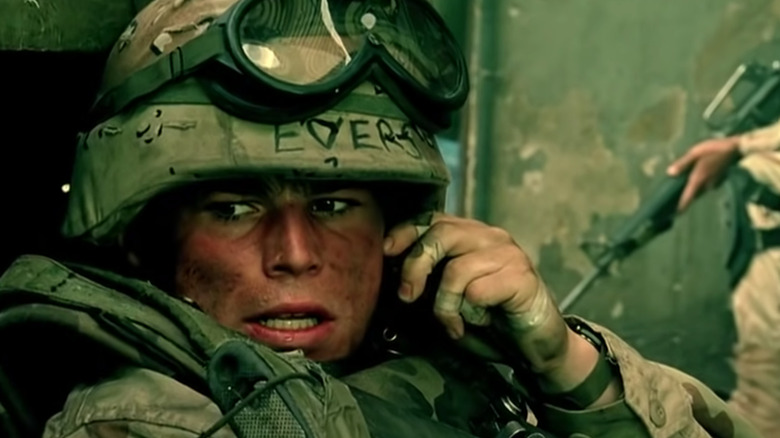
Eversmann talks on the radio- Sony Pictures
In October of 1993, Task Force Ranger moved into Mogadishu to capture Mohamed Farrah Aidid. The unit, led by Major General Garrison, had received information about the warlord’s position via a source within his network. Said source was given the codename “Lincoln” (presumably because he looked like Abraham Lincoln), according to former U.S. Army Ranger Jason Moore, a Radio Telephone Operator for Chalk IV helicopter Super 67, in an interview with PBS.
But much of the intel Lincoln provided was inaccurate, leaving many of the men to question whether they could trust him. The Rangers never captured Aidid (dubbed “Elvis”) in any of their missions, including the one that took place on October 3.
Following the tragic events of Mogadishu, some speculated that Lincoln may have been a double agent who lured Americans into a trap set by Aidid. Initially, Moore didn’t consider the possibility, but explained how his views changed after the events depicted in “Black Hawk Down,” mostly because of how quickly the massive force they encountered was able to assemble. “It definitely crossed your mind that maybe he was a double agent or at least led us into the lions’ den,” Moore said.
Moore noted that his chopper took missile fire from the moment it arrived, almost like “they were waiting for us to come to that location that day, at that time.”
Aidid purposefully targeted helicopters
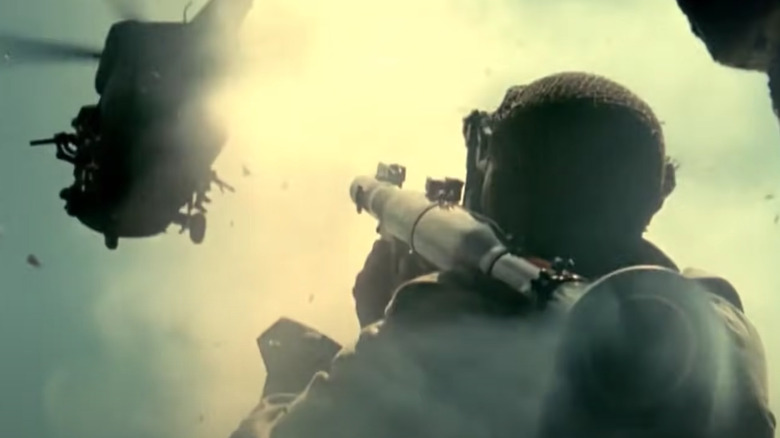
Somali fires missile at helicopter- Sony Pictures
The turning point in the Battle of Mogadishu arrived when a Black Hawk helicopter with the call sign Super 61 was struck by a missile and sent spinning out of control. The vehicle crashed and injured or killed many of the crew, including the aforementioned Daniel Busch.
“It took a direct hit to the tail boom and started a slow rotation,” Delta Force operator Norm Hooten told CBS News in his first public comments on the incident. “It was a catastrophic impact. That’s the only way I can describe it.”
Later, another Black Hawk chopper, dubbed Super 64, was likewise shot out of the sky, creating even more pandemonium.
As it turns out, Mohammed Farrah Aidid purposefully targeted the helicopters. He felt that doing so would allow his men to gain a tactical advantage. “He made the determination that the helicopters were the vulnerability, or the center of gravity,” explained General Anthony Zinni in the “Frontline” documentary “Ambush in Mogadishu.” Aidid ordered his men to stand on rooftops with machine guns and rocket launchers, where they were to concentrate their fire on the helicopters. “He really believed that if he shot a helicopter down, that would cause [the U.S. soldiers] to gather around the helicopters,” Zinni said. “They could fix them and pin them in one area.”
A daytime raid was highly unusual
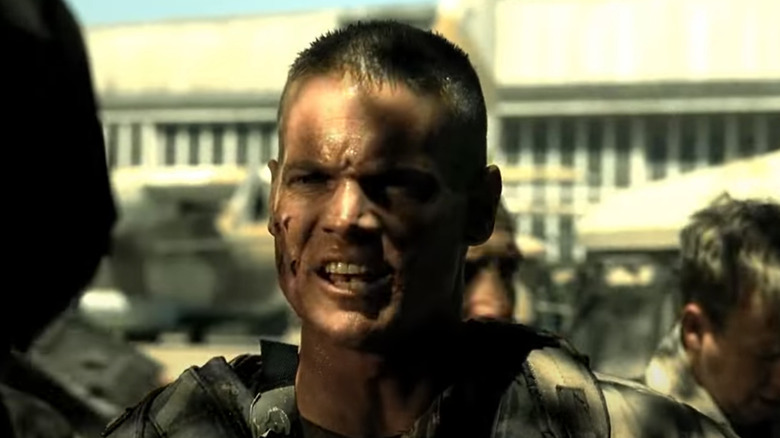
Struecker gives orders- Sony Pictures
If you want to hear an interesting perspective from one of the soldiers involved in the Battle of Mogadishu, listen to the in-depth interview by the American Veterans Center with Major Jeff Struecker. The former U.S. Ranger, now an author and pastor, drops some fascinating nuggets about the conflict, including his thoughts on the decision to execute the operation in broad daylight.
For those unaware, Struecker is the Humvee driver in “Black Hawk Down” who tells a frightened solider, “Everyone feels the same way you do, it’s what you do right now that makes a difference…” — which actually happened, by the way.
In the interview, the real Struecker admits he was weary of attacking in the middle of the day. “I want to stress … this is what’s called sometimes a daring daylight raid. This was really, really unusual for special operations.” Struecker goes on to explain that special operators typically train to work under cover of darkness and utilize technology and equipment that allows them to do so. “They’re most capable and lethal on the battlefield at night,” he says. Struecker also reveals that the hasty decision to fly into combat in broad daylight was due to intense pressure from the Clinton administration, which needed to see something from Task Force Ranger to justify the unit’s continued operation in Somalia.
Khat played a big role in the battle
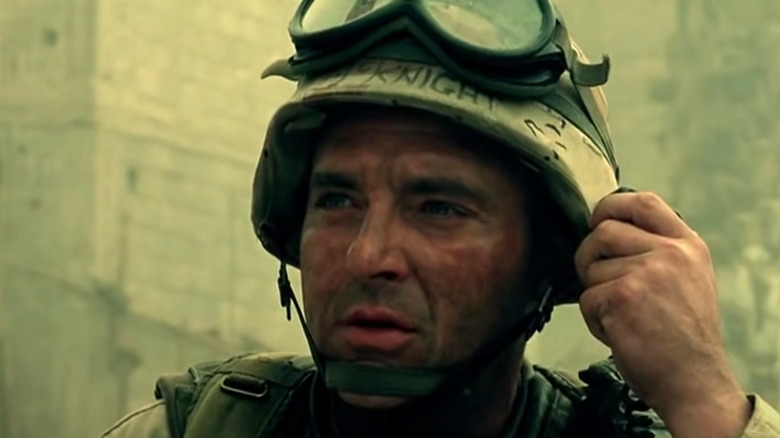
McKnight looks ahead- Sony Pictures
Another interesting tidbit revealed by Major Jeff Struecker was that a majority of the Somali militiamen were driven in large part by drugs. He told his men as much during a pre-mission meeting. While Struecker warned that the people of Mogadishu weren’t going to roll over without a fight and would die for their cause, others were simply fueled by an African drug called Khat.
“The distribution of drugs made guys willing to go do something that’s really illogical. It doesn’t make sense, because they were all hopped up on this African drug called Khat. But they were willing to fight for more drugs and willing to kill or die for more drugs,” he says in the interview.
For those unaware, Khat is, according to an article on MSNBC (via WISTV.com), “a plant grown in the Horn of Africa and chewed like tobacco for its stimulant buzz.” The same article also notes that there is much debate over how strong an effect the juicy Khat leaves have on an individual, with some likening it more to a super-caffeinated cup of coffee than any illegal substances.
Interestingly, Ridley Scott’s film makes a brief reference to the drug when one of the soldiers notes that the local militiamen will be “all f***** up on Khat,” although it’s a minor (albeit important) bit of dialogue that’s easy to miss.
A Black Hawk was shot down a week earlier
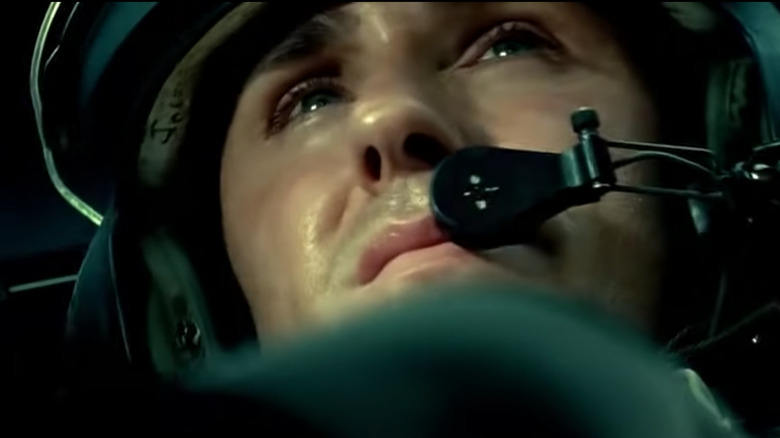
Mike Durant flying a chopper- Sony Pictures
Tensions between the U.S. troops and the Somalis was already tense before the Battle of Mogadishu, due in large part to an eerily similar event that occurred in the city one week earlier. According to news reports, a Black Hawk helicopter sustained a missile strike on September 25 and crashed in Mogadishu. The chopper was on patrol when it was shot down near an deserted presidential palace. Three U.S. crewmen were killed in the attack, per the Washington Post, while three other Americans and three Pakistanis sustained injuries.
According to Army Times, the event played out like a miniature “Black Hawk Down” as the Pakistani soldiers incurred their wounds while attempting to secure the crash site, but were ultimately overwhelmed by hostile fire.
The Washington Post reported that no one claimed credit for the attack, but wrote: “U.S. military officials blamed militiamen loyal to fugitive warlord Mohamed Farah [Aidid], who is accused of staging bloody ambushes and mortar bombardments against U.S. troops and other U.N. peace keepers.” The article also claimed that Somalis paraded around the burnt helicopter, displayed body parts of the slain soldiers and “carried around a decapitated corpse in a food sack.”
If anything, the event increased debate in the U.S. about the deployment of troops to Somalia, which many claimed had turned into a military quagmire.
Fallout from the battle
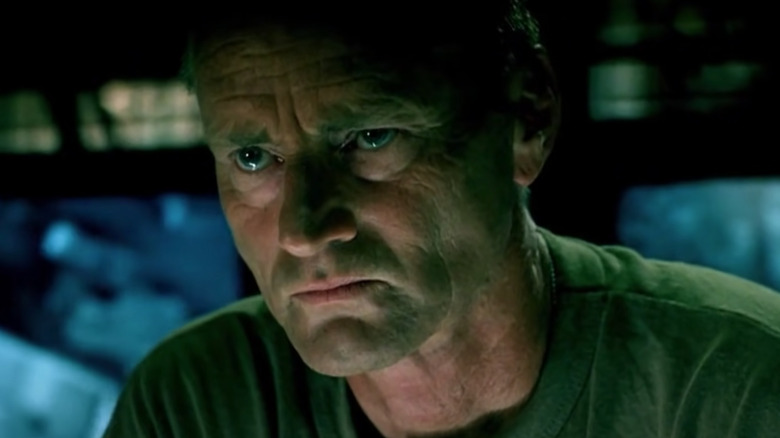
Major Garrison checks out a monitor- Sony Pictures
“Black Hawk Down” largely ignores the politics behind the event and focuses instead on the camaraderie between the soldiers who do whatever it takes to bring each other home. A card at the end of the film tell us that President Clinton withdrew Delta Force and The Rangers from Somalia two weeks later, but we don’t learn anything more about the fallout — political or otherwise — of Operation Gothic Serpent.
In reality, the event drew political backlash in the United States, which was the main reason President Clinton pulled the men out on March 31, 1994. What’s more, the Battle of Mogadishu had a drastic impact on U.S. foreign intervention. As “Black Hawk Down” author Mark Bowden wrote in an article published in Smithsonian magazine in 2019, “After Mogadishu, the United Stated became wary of deploying ground forces anywhere.” He added that such weariness kept the U.S. from intervening in the Rwandan genocide and the Bosnian Serbs’ violent campaign against Muslim and Croatian civilians in 1995.
Such reluctance ended after September 11, 2001, when President George W. Bush — and later, President Barack Obama — sent troops to Iraq and Afghanistan in retaliation for terrorist attacks on U.S. soil. But even then, Bowden explained, “they kept their distance from the Islamic insurgents in Somalia.” In recent years, American aggression towards Somalia has kicked up a notch. The military conducted 63 airstrikes in the region from 2017-2019 and more than doubled its military force there, leading to the deaths of a number of American servicemen.
The Somali perspective was much different
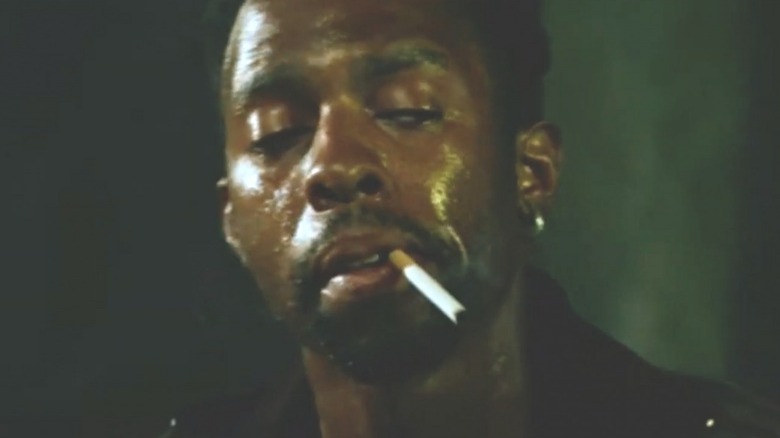
A Somali soldier with cigarette- Sony Pictures
A main criticism of Ridley Scott’s “Black Hawk Down” is that we don’t see the conflict from Somalia’s point of view, leading critics such as Owen Gleiberman of Entertainment Weekly to label the film racist, according to The Guardian.
As a result, per The Nation, Somali community leaders based in Minneapolis, fearing that the film would lead to a backlash against Somali refugees living in America, launched a campaign to boycott “Black Hawk Down” the day before its premiere on January 18, 2002. The protestors believed the film omitted a lot of important details. From 1982 to 1990, for example, “the U.S. viewed Somalia as a partner in defense, training officers of the country’s National Armed Forces in US military schools and providing them with weapons.”
At least one member of the “Black Hawk Down” cast spoke out against the film for this reason, as detailed in the same article. Brendan Sexton III, who portrays “Alphabet” Kowalewski, appeared before students at Columbia University in February of 2002 and explained how he felt “the film oversimplifies and inaccurately portrays Somalis as ‘savages without any reason to oppose the U.S. military presence in Somalia.'”
In reality, according to Yusuf Hassan of BBC’s Somali service, many of the Somalis who fought in the battle “were just people in the neighborhood who got caught up in this fire and were trying to defend their homes, as they thought they were under attack.”
Source: Looper

